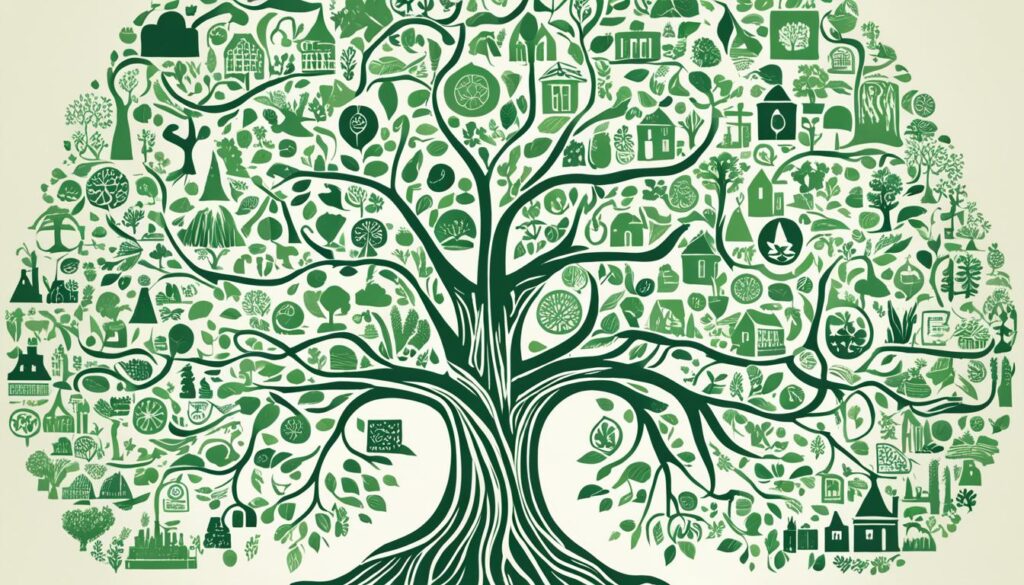Cultural influences on the poverty mindset have long been a topic of interest in the field of poverty research. The previous generation of scholars focused on the concept of a “culture of poverty”, suggesting that individuals in poverty develop a set of attitudes, beliefs, and practices that perpetuate their own poverty. However, more recent research has challenged this notion and proposed a more nuanced understanding of how culture shapes the poverty mindset.
Scholars now consider cultural concepts such as values, frames, repertoires, narratives, symbolic boundaries, cultural capital, and institutions to understand how individuals living in poverty and policy elites perceive and respond to poverty. This shift in perspective highlights the importance of understanding the cultural context in which poverty exists and the role it plays in shaping perceptions and behaviors surrounding wealth and success.
Key Takeaways:
- Cultural influences shape the poverty mindset and perceptions of wealth and success.
- Previous research on a “culture of poverty” has been challenged by more nuanced understandings.
- Values, frames, repertoires, narratives, symbolic boundaries, cultural capital, and institutions are key cultural concepts to consider in poverty research.
- Understanding the cultural context is crucial for effective poverty policies and interventions.
- Cultural influences play a significant role in the complexities of poverty and should be recognized by researchers and policymakers.
The Experience of Poverty and Cultural Beliefs
The experience of poverty is influenced by cultural beliefs and perspectives. Research has shown that different cultural settings can shape the poverty mindset in various ways. For example:
“Hispanic and black blue-collar workers may have different perceptions regarding joblessness, leading to a greater reluctance among black workers to provide support to co-ethnics in their job search.”
This finding highlights the role of cultural determinants in shaping attitudes and behaviors related to poverty. It suggests that individuals’ cultural backgrounds can influence their willingness to support others in similar circumstances, even within the same socio-economic context.
Additionally, there are cultural variations in the definition of a “good job.” Young African-American men, for instance, exhibit diverse perspectives influenced by their prior work experience and educational background:
“Understanding these cultural variations can provide insights into the work orientation of low-income individuals.”
These cultural perspectives on what constitutes a good job can impact the aspirations of individuals living in poverty. Research has found that low-income young people often have lower ideals and expectations for higher education attainment compared to their non-poor counterparts:
“These cultural beliefs and values play a role in shaping educational outcomes and should be considered in poverty research.”
Recognizing the influence of cultural context on the poverty mindset is crucial for formulating effective poverty alleviation strategies that address the specific needs and perspectives of diverse cultural groups.
Cultural Perspectives on Poverty Mindset
| Cultural Perspective | Impact on Poverty Mindset |
|---|---|
| Perceptions of Joblessness | Differences in support networks and attitudes towards co-ethnics |
| Definition of a “Good Job” | Diverse perspectives influenced by prior work experience and educational background |
| Ideals and Expectations for Education | Lower aspirations for higher education attainment among low-income individuals |
Understanding these cultural perspectives can inform targeted interventions and policies aimed at addressing the poverty mindset in different cultural settings.
Cultural Factors and Parenting Behaviors
In examining the poverty mindset and culture, it is important to consider the influence of cultural factors on parenting behaviors and the role of child support in poverty. Research has shown that non-economic factors play a significant role in how parents perceive the role of fathers in their children’s lives. Caregiving, spending time together, role modeling, and material support are all critical aspects of parenting that shape parents’ perspectives on their responsibilities.
While financial support is undoubtedly important, it should not overshadow the significance of non-economic factors. These elements of parenting contribute to the development of children’s well-being and are crucial for breaking the cycle of poverty. Recognizing the importance of these factors allows us to understand the complexities of poverty and the cultural dimensions that influence it.
“Non-economic factors such as caregiving, spending time, role modeling, and material support are important to parents in their perception of a father’s role.”
Moreover, the prevailing view that unwed pregnancy in the inner city stems solely from men’s unwillingness to commit to long-term monogamous relationships has been challenged. This highlights the heterogeneity of inner-city culture and the varied logics underlying attitudes toward faithfulness and non-monogamy. To understand the dynamics of poverty and its impact on parenting behaviors, it is essential to consider the diverse cultural factors at play.
Culture shapes the way individuals understand and navigate poverty, and as such, policymakers must take cultural perspectives on the poverty mindset into account when discussing poverty-related issues. By recognizing and addressing these cultural factors, we can develop more contextually appropriate policies that aim to uplift individuals and families living in poverty.
Parenting Behaviors Affected by Cultural Factors:
- Caregiving and nurturing
- Role modeling
- Spending time together
- Material support
Understanding how these cultural factors influence parenting behaviors can provide valuable insights into effective strategies for supporting families in poverty and promoting positive outcomes for children.

Culture, Policy, and Social Change
The study of culture and poverty has significant implications for policymaking and social change. Cultural influences can shape the poverty mentality and impact the effectiveness of policies aimed at addressing poverty.
Research has shown that political institutions play a crucial role in giving a voice to the poor in policymaking. Local public forums have been found to provide opportunities for participation, creating a new “political culture” that prioritizes the needs of the poorest citizens.
“Local public forums have the power to create a space where the voices of those in poverty are heard, contributing to more inclusive and effective policies.”
Cultural lenses among policy elites can also shape antipoverty policy approaches and priorities. Different conceptions of poverty influenced by cultural perspectives can lead to shifts in policy strategies and decision-making.
Understanding the influence of culture on poverty mentality is essential for informing more effective social policies. By recognizing and considering cultural factors in policymaking, we can develop comprehensive approaches that address the complex and multifaceted nature of poverty.
Implications for Cultural-Informed Policies
Cultural-informed policies can have a profound impact on poverty alleviation. By acknowledging the influence of culture on poverty mentality, policymakers can create programs and interventions that are tailored to specific cultural contexts.
One example of the influence of culture on policy is seen in the provision of educational resources. Research has highlighted how cultural beliefs and values shape individuals’ attitudes towards education and their aspirations for higher education attainment. By understanding these cultural dynamics, policymakers can design targeted interventions that address the unique challenges faced by low-income individuals in accessing quality education.
Another example is the influence of cultural norms and values on labor market policies. Cultural perspectives on work and income generation can impact the design of workfare programs and the level of support provided to individuals living in poverty. Recognizing these cultural factors can inform the development of policies that promote work opportunities, while also respecting and valuing diverse cultural perspectives on work.
The Role of Cultural Competence
Cultural competence is key in policymaking and social change efforts. Recognizing the influence of culture on poverty mentality requires policymakers to engage with diverse communities, understand their cultural values, and consider their unique perspectives when shaping policies.
| Cultural Competence in Policymaking | Key Benefits |
|---|---|
| Engaging marginalized communities | Ensures policies are inclusive and responsive to the needs of all individuals |
| Understanding cultural beliefs and values | Helps shape policies that align with the aspirations and aspirations of diverse communities |
| Promoting equity and social justice | Reduces disparities and fosters a more equitable society |
Cultural competence in policymaking can lead to more meaningful and sustainable social change. By valuing and incorporating diverse cultural perspectives, policies can address the root causes of poverty and promote long-term well-being for all individuals.

How Does Education Play a Role in Influencing the Poverty Mindset?
Education’s role in poverty mindset is significant. Access to quality education allows individuals to develop critical thinking, problem-solving, and decision-making skills, which are essential for overcoming poverty. It provides opportunities for upward mobility and empowers individuals to break the cycle of poverty through knowledge and education.
Conclusion
Cultural influences are vital determinants in shaping the poverty mindset and the experiences of individuals living in poverty. Understanding the cultural context surrounding poverty is crucial in comprehending the intricate nature of poverty and developing effective social policies. The previous focus on a “culture of poverty” has been challenged, leading to a nuanced understanding of the cultural factors that influence attitudes, behaviors, and perceptions related to poverty. Researchers and policymakers must consider cultural perspectives on the poverty mindset to address poverty in a comprehensive and contextually appropriate manner.
FAQ
How does culture influence the poverty mindset?
Culture plays a significant role in shaping the poverty mindset by influencing attitudes, beliefs, and practices surrounding poverty. Understanding the cultural context in which poverty exists is essential for comprehending the complexities of poverty and developing effective social policies.
What are the cultural factors that shape the poverty mindset?
Cultural factors such as values, frames, repertoires, narratives, symbolic boundaries, cultural capital, and institutions influence how individuals in poverty and policy elites perceive and respond to poverty. These factors provide insights into the cultural context in which poverty exists and its impact on wealth and success.
How do cultural beliefs influence the experience of poverty?
Cultural beliefs can lead to different perceptions regarding joblessness and work orientation among individuals in poverty, as well as lower ideals and expectations for educational success. These cultural beliefs and values shape educational outcomes and should be considered in poverty research and policy-making.
How do cultural factors affect parenting behaviors and the role of child support in poverty?
Cultural factors influence parenting behaviors by shaping perceptions of a father’s role, with non-economic factors such as caregiving, spending time, role modeling, and material support being important considerations. Cultural factors also challenge prevailing views on unwed pregnancy in the inner city, highlighting the heterogeneity of inner-city culture and its impact on issues related to poverty.
What role does culture play in policymaking and social change regarding poverty?
Culture influences policymaking by shaping the voice of the poor, with local public forums providing opportunities for participation and creating a new “political culture” that advocates for the needs of the poorest citizens. Cultural differences among policy elites also impact antipoverty policy, leading to shifts in approaches and priorities. Understanding these cultural influences can inform more effective social policies that address the complexities of poverty.

